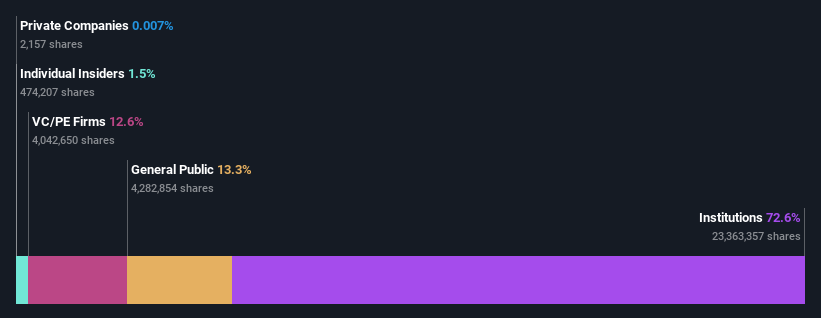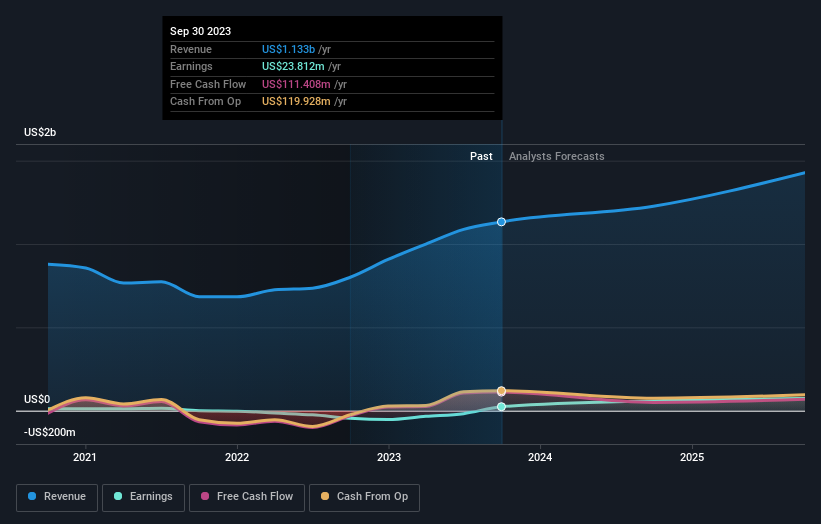Institutional owners may ignore Blue Bird Corporation's (NASDAQ:BLBD) recent US$60m market cap decline as longer-term profits stay in the green
Key Insights
Institutions' substantial holdings in Blue Bird implies that they have significant influence over the company's share price
A total of 12 investors have a majority stake in the company with 52% ownership
Using data from analyst forecasts alongside ownership research, one can better assess the future performance of a company
If you want to know who really controls Blue Bird Corporation (NASDAQ:BLBD), then you'll have to look at the makeup of its share registry. We can see that institutions own the lion's share in the company with 73% ownership. In other words, the group stands to gain the most (or lose the most) from their investment into the company.
Institutional investors endured the highest losses after the company's market cap fell by US$60m last week. Still, the 119% one-year gains may have helped mitigate their overall losses. But they would probably be wary of future losses.
Let's take a closer look to see what the different types of shareholders can tell us about Blue Bird.
See our latest analysis for Blue Bird
What Does The Institutional Ownership Tell Us About Blue Bird?
Institutions typically measure themselves against a benchmark when reporting to their own investors, so they often become more enthusiastic about a stock once it's included in a major index. We would expect most companies to have some institutions on the register, especially if they are growing.
We can see that Blue Bird does have institutional investors; and they hold a good portion of the company's stock. This suggests some credibility amongst professional investors. But we can't rely on that fact alone since institutions make bad investments sometimes, just like everyone does. If multiple institutions change their view on a stock at the same time, you could see the share price drop fast. It's therefore worth looking at Blue Bird's earnings history below. Of course, the future is what really matters.
Investors should note that institutions actually own more than half the company, so they can collectively wield significant power. Blue Bird is not owned by hedge funds. Our data shows that American Securities LLC is the largest shareholder with 13% of shares outstanding. Meanwhile, the second and third largest shareholders, hold 6.3% and 5.2%, of the shares outstanding, respectively. Additionally, the company's CEO Philip Horlock directly holds 1.1% of the total shares outstanding.
A closer look at our ownership figures suggests that the top 12 shareholders have a combined ownership of 52% implying that no single shareholder has a majority.
While it makes sense to study institutional ownership data for a company, it also makes sense to study analyst sentiments to know which way the wind is blowing. There are a reasonable number of analysts covering the stock, so it might be useful to find out their aggregate view on the future.
Insider Ownership Of Blue Bird
The definition of an insider can differ slightly between different countries, but members of the board of directors always count. The company management answer to the board and the latter should represent the interests of shareholders. Notably, sometimes top-level managers are on the board themselves.
I generally consider insider ownership to be a good thing. However, on some occasions it makes it more difficult for other shareholders to hold the board accountable for decisions.
We can see that insiders own shares in Blue Bird Corporation. As individuals, the insiders collectively own US$12m worth of the US$846m company. This shows at least some alignment. You can click here to see if those insiders have been buying or selling.
General Public Ownership
With a 13% ownership, the general public, mostly comprising of individual investors, have some degree of sway over Blue Bird. While this size of ownership may not be enough to sway a policy decision in their favour, they can still make a collective impact on company policies.
Private Equity Ownership
With a stake of 13%, private equity firms could influence the Blue Bird board. Some might like this, because private equity are sometimes activists who hold management accountable. But other times, private equity is selling out, having taking the company public.
Next Steps:
While it is well worth considering the different groups that own a company, there are other factors that are even more important. For example, we've discovered 1 warning sign for Blue Bird that you should be aware of before investing here.
If you would prefer discover what analysts are predicting in terms of future growth, do not miss this free report on analyst forecasts.
NB: Figures in this article are calculated using data from the last twelve months, which refer to the 12-month period ending on the last date of the month the financial statement is dated. This may not be consistent with full year annual report figures.
Have feedback on this article? Concerned about the content? Get in touch with us directly. Alternatively, email editorial-team (at) simplywallst.com.
This article by Simply Wall St is general in nature. We provide commentary based on historical data and analyst forecasts only using an unbiased methodology and our articles are not intended to be financial advice. It does not constitute a recommendation to buy or sell any stock, and does not take account of your objectives, or your financial situation. We aim to bring you long-term focused analysis driven by fundamental data. Note that our analysis may not factor in the latest price-sensitive company announcements or qualitative material. Simply Wall St has no position in any stocks mentioned.


